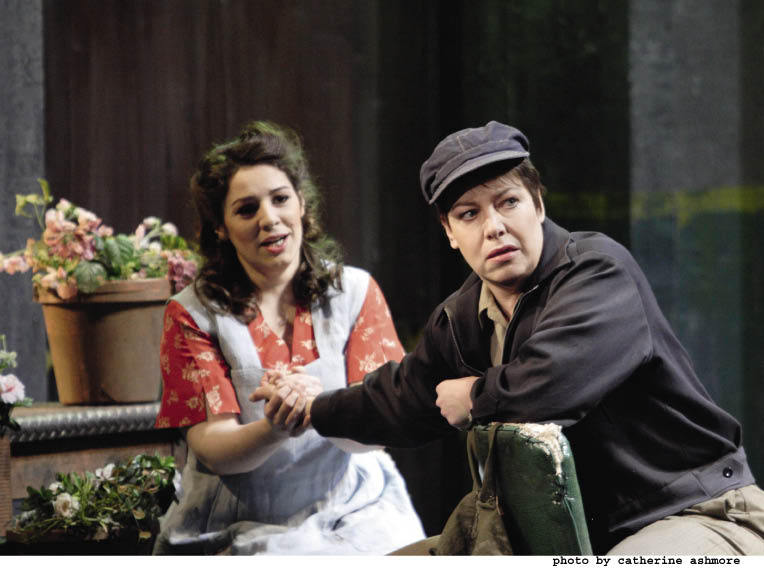The opening performance of the Royal Opera’s first revival of Fidelio, in the production by Jürgen Flimm which was unwisely imported in 2007, was so dreary that it would be better not to comment on it, except that it seems worth separating the inherently feeble elements from the ones that happened to be present, and which may well have disappeared in later performances.
The opening performance of the Royal Opera’s first revival of Fidelio, in the production by Jürgen Flimm which was unwisely imported in 2007, was so dreary that it would be better not to comment on it, except that it seems worth separating the inherently feeble elements from the ones that happened to be present, and which may well have disappeared in later performances.
Kirill Petrenko was scheduled to conduct, and on the evidence of his past visits to the Royal Opera the result would have been impressive. A recurring back problem forced him to withdraw very late in rehearsals, and Mark Elder stepped into the breach. From Glyndebourne we know that he can conduct this difficult opera magnificently, but I suspect that he is someone who needs long and careful rehearsals. Whatever, the first night was musically mainly miserable.
There’s always a question about how to take the Overture, that is the one actually called Fidelio, as opposed to the three Leonores. It isn’t very dramatic, but it doesn’t serve as any kind of scene-setter either. Elder delivered it brusquely, with brass well to the fore, as if he wanted it to convey something of the heroic spirit the opera celebrates. That didn’t work.
The curtain rose on the nondescript set, an open space — the whole of the stage — with Marzelline ironing outdoors, where there was office furniture, too, so a reliable climate, presumably tropical. The prison bars, through which arms strain from early on, are to the right. All very spacious and unatmospheric, and Flimm tries to ensure that no character is less then five yards away from any other. Marzelline and Jaquino are both taken by performers with little voices, and their scene together didn’t work either as opera buffa or as the quotidian ground from which the grand action emerges.
Hopes rose with the entry of Kurt Rydl, the threatening bass of many an evening at Covent Garden. His voice has deteriorated, however, and now is afflicted with a wobble; nor did he characterise the interesting figure of Rocco, genial, venal, materialistic, to any depth. But the fourth contributor to the first sublime music in the opera, Fidelio herself, Nina Stemme making her stage debut in the role, really did give the heart a lift. She looks convincingly young-mannish, and her voice has grown to be a magnificent instrument, even if it lacks a variety of colours. Still, the Quartet worked and was the evening’s magic moment.
After Rocco’s little song in praise of money, Act I should surge in one mighty sweep to its end. It didn’t, and the fundamental weakness of the performance became clear: the timing of the moves from spoken dialogue to music, and vice versa, more crucial to sustaining tension in this than in almost any other opera, was indecisive and awkward. Once again the vast distances were partly to blame. Also the weakness of John Wegner, the villain Pizarro, who produced sudden blasts of sound between periods of near-inaudibility; and the unmoving effect, in all ways, of the Prisoners’ Chorus.
Endrik Wottrich began Act II with so long-drawn a ‘Gott!’ that it wasn’t likely he could go on in so striking a way. After that he was mostly small-scale, sympathetic, but not necessarily worth all the trouble that Pizarro goes to to murder him and Fidelio to save him. The final scene of celebration, for all the magnificent chorus, was half-hearted. As I said at the start, things could, must, get a lot better in the run.
I went to the King’s Head Islington for the latest offering of OperaUpClose, Pagliacci, in a new version (of the text) by Anna Gregory. It is by far the most successful thing it has done so far, undermined only by a drama-draining interval of Royal Opera prolixity, giving first-timers the impression that an evening at the opera is some drinks at the bar with some noisy music on either side.
The production and performance, however, are tremendous, as intense and compelling as any account of this piece I have seen. That is largely thanks to two seasoned performers, Dominic Barrand as the vengeful cripple Tonio, and Paul Featherstone as Canio, the clown whose heartbreak leads him to murder his wife and her lover. These two are singing actors of extraordinary calibre. The other performers don’t let them down, and the couple who sit in the audience and make nuisances of themselves provide great comic relief and, in their reluctance to abandon their mobile phones, are horribly true to life.
I did think that OperaUpClose was concerned to nurture young talent, mainly, but if the first thing is to recruit whoever it can, so long as it advances the aim of ‘accessible’ opera, then it has made wise choices. And the accompaniment for clarinet, viola and piano is brilliantly done and executed. In little more than a year OperaUpClose has made itself an indispensable part of the London scene.
CATHERINE ASHMORE






Comments